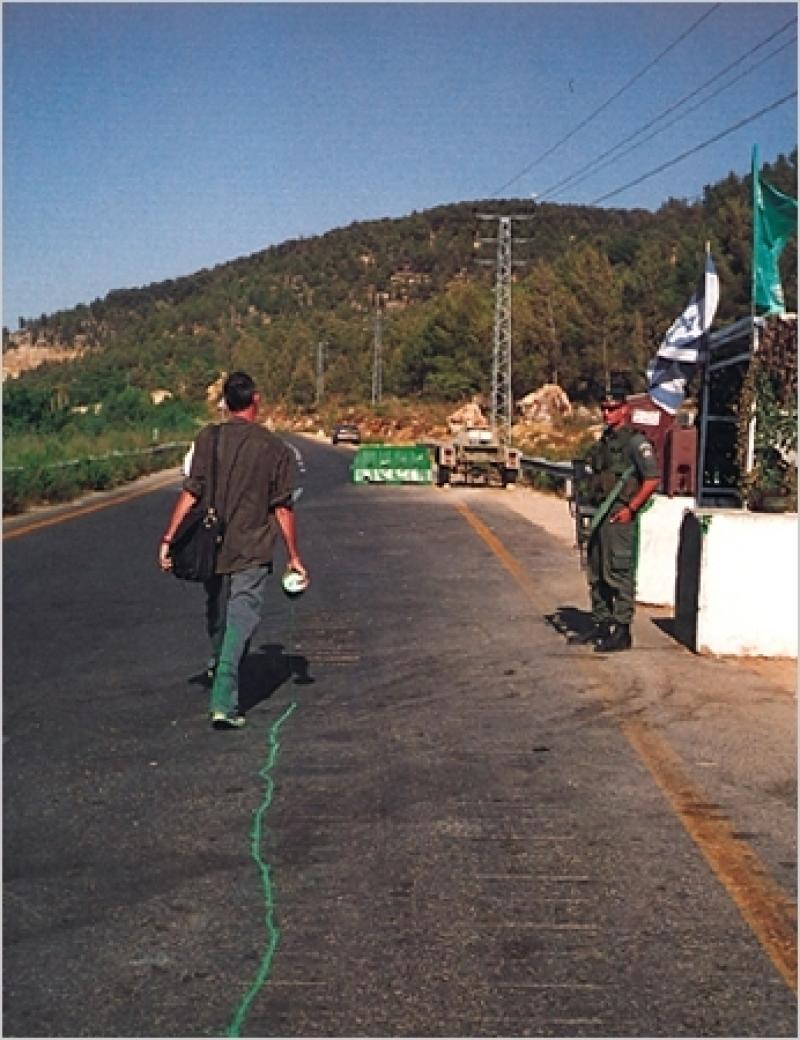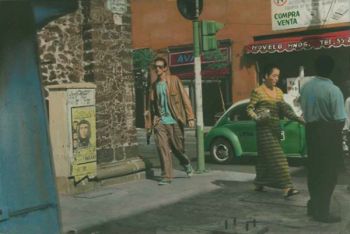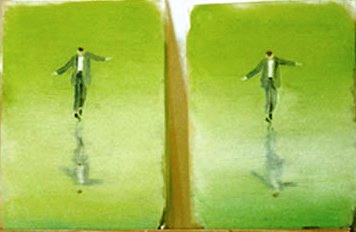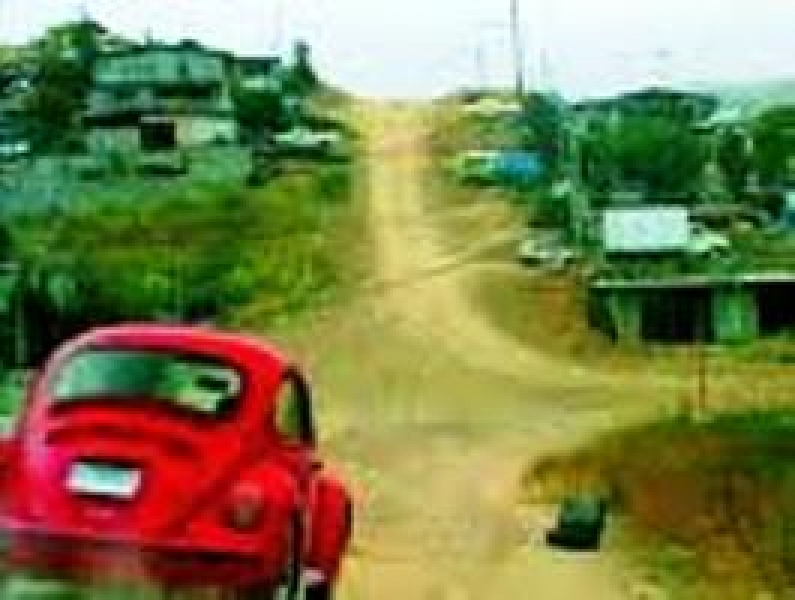Francis Alÿs: A Story of Deception, Tate Modern | reviews, news & interviews
Francis Alÿs: A Story of Deception, Tate Modern
Francis Alÿs: A Story of Deception, Tate Modern
Whimsical, charming - and important. Alys dazzles at Tate Modern

In 1994, Francis Alÿs joined the regular hiring-line in the central square in Mexico City. Standing next to plumbers and carpenters with their hand-lettered signs touting their skills, his sign read "Turista", as he offered his ability to be an outsider looking in.
Whimsical, charming, meditative – these are all adjectives that have long been applied to the Belgian artist who has lived and worked in Mexico for a quarter of a century. But with this thrilling retrospective, a new adjective has to be added to the list: important. Alÿs, understated as always, makes no great claims for his works: walking, he says, is simply a way of telling stories. But the stories he chooses make him a narrator of tales that matter. In Re-enactments (pictured right) two films run simultaneously. In one, Alÿs walks through Mexico City with a gun, pointed at the ground, but nonetheless in plain view. No one reacts, no one appears to notice what may well be a hitman on his way a job, or a murderous husband on the rampage. But someone must have noticed, for the film ends with a police car screaming up, a gun aimed at his own head and his arrest. The second film is almost identical: labelled "re-enactment", it recreates that first walk minutely, right down to his arrest and disappearance into the squad-car, yet with different people in the background identically determinedly uninvolved.
In Re-enactments (pictured right) two films run simultaneously. In one, Alÿs walks through Mexico City with a gun, pointed at the ground, but nonetheless in plain view. No one reacts, no one appears to notice what may well be a hitman on his way a job, or a murderous husband on the rampage. But someone must have noticed, for the film ends with a police car screaming up, a gun aimed at his own head and his arrest. The second film is almost identical: labelled "re-enactment", it recreates that first walk minutely, right down to his arrest and disappearance into the squad-car, yet with different people in the background identically determinedly uninvolved.
Uninvolvement does not describe the bystanders in The Green Line, a film subtitled “(Sometimes doing something poetic can become political and sometimes doing something political can become poetic)”. Walking, says the artist, is an attitude: it’s “a very immediate and handy way of interacting and eventually interfering within a given context”. The Green Line is the border established by the UN after the 1948 Arab-Israeli war, since breached by Israel, and the artist recreates a political and geographical metaphor literally, drizzling a line of green paint from a leaking can as he goes. No one is uninvolved in this event: shouting children follow him as he nonchalantly strolls; residents watch from their gardens, curious, or annoyed, sometimes just waving to the following camera. In the gallery the film is accompanied by 10 commentators’ views, switched on or off by the viewers. Now all are intertwined: the artist by his action, those filmed as he passes by theirs, the commentators and the gallery-visitors. The walk is no longer a poetic statement, an act of absurdist defiance in the face of an uncaring world, but a gesture of political engagement.
Yet futility is never far from the surface, and Alÿs’ work is an illustration and working-out of the fraud perpetrated on us all by the great con-trick of modernization, that the future will always be bigger, better, shinier, brighter. Paradox of Praxis 1 (Sometimes Doing Something Leads to Nothing) (video below) is the epitome of futility, as Alÿs pushes a rapidly melting block of ice around Mexico City, until all that is left is a rapidly vanishing puddle. Life is hard, the film tells us, and for many, Herculean effort comes to nothing. A Story of Deception, a film shot on an endlessly unrolling road in Patagonia, where watery pools endlessly turn into yet one more mirage, encapsulates much of his work. Despite this, Alÿs’ work, and world, is one of infinite charm. His acrylic paintings, often semi-caricatured in style, have a comic edge, with the figures often looking like they wandered out of a Tintin book, even while they are unsettling – Déjà vu (left) is two identical small panels that show a small gestural brushstroke of a man reflected in a puddle, sited in two different rooms: you see the first, wonder if the reflection is the déjà-vu element, then move on to other pieces; by the time the second pops up in another room, you have forgotten the title, and wonder if you have mistakenly doubled back. Déjà vu not a major piece, but that brief "ping" of uncertainty is achieved with remarkable wit and brevity. A different kind of wit, more pointed, a bit sour, was displayed as Alÿs’ contribution to the 2001 Venice Biennale (not on show here). Asked to participate, Alÿs signalled both his attitude to art-world display, and to his own pride, or otherwise, at being asked, by sending a peacock to represent him.
Despite this, Alÿs’ work, and world, is one of infinite charm. His acrylic paintings, often semi-caricatured in style, have a comic edge, with the figures often looking like they wandered out of a Tintin book, even while they are unsettling – Déjà vu (left) is two identical small panels that show a small gestural brushstroke of a man reflected in a puddle, sited in two different rooms: you see the first, wonder if the reflection is the déjà-vu element, then move on to other pieces; by the time the second pops up in another room, you have forgotten the title, and wonder if you have mistakenly doubled back. Déjà vu not a major piece, but that brief "ping" of uncertainty is achieved with remarkable wit and brevity. A different kind of wit, more pointed, a bit sour, was displayed as Alÿs’ contribution to the 2001 Venice Biennale (not on show here). Asked to participate, Alÿs signalled both his attitude to art-world display, and to his own pride, or otherwise, at being asked, by sending a peacock to represent him. Yet the sheer folly of life is joyously exposed in Rehearsal I (right), a film in which the stops, starts, repetitions and stutters of a brass band rehearsing are synchronized to the image of a Volkswagen Beetle trying (and failing) to drive up a dirt road. When the music stops, the car rolls back; when the music begins again, the car gains traction. As it drives past dusty houses perilously perched on the hill, the car is clearly a metaphor for developing countries and their struggle. Yet all the time, the band resolutely begins again, a brassy, defiant, absurdly hopeful sound as it looks forward – a fine symbol for a fine show.
Yet the sheer folly of life is joyously exposed in Rehearsal I (right), a film in which the stops, starts, repetitions and stutters of a brass band rehearsing are synchronized to the image of a Volkswagen Beetle trying (and failing) to drive up a dirt road. When the music stops, the car rolls back; when the music begins again, the car gains traction. As it drives past dusty houses perilously perched on the hill, the car is clearly a metaphor for developing countries and their struggle. Yet all the time, the band resolutely begins again, a brassy, defiant, absurdly hopeful sound as it looks forward – a fine symbol for a fine show.
- Francis Alÿs, A Story of Deception at Tate Modern until 5 September
Watch Alÿs’ Paradox of Praxis I, 1997
Explore topics
Share this article
more Visual arts
 Fantastic Machine review - photography's story from one camera to 45 billion
Love it or hate it, the photographic image has ensnared us all
Fantastic Machine review - photography's story from one camera to 45 billion
Love it or hate it, the photographic image has ensnared us all
 Yinka Shonibare: Suspended States, Serpentine Gallery review - pure delight
Weighty subject matter treated with the lightest of touch
Yinka Shonibare: Suspended States, Serpentine Gallery review - pure delight
Weighty subject matter treated with the lightest of touch
 Jane Harris: Ellipse, Frac Nouvelle-Aquitaine MÉCA, Bordeaux review - ovals to the fore
Persistence and conviction in the works of the late English painter
Jane Harris: Ellipse, Frac Nouvelle-Aquitaine MÉCA, Bordeaux review - ovals to the fore
Persistence and conviction in the works of the late English painter
 Sargent and Fashion, Tate Britain review - portraiture as a performance
London’s elite posing dressed up to the nines
Sargent and Fashion, Tate Britain review - portraiture as a performance
London’s elite posing dressed up to the nines
 Zineb Sedira: Dreams Have No Titles, Whitechapel Gallery review - a disorientating mix of fact and fiction
An exhibition that begs the question 'What and where is home?'
Zineb Sedira: Dreams Have No Titles, Whitechapel Gallery review - a disorientating mix of fact and fiction
An exhibition that begs the question 'What and where is home?'
 Yoko Ono: Music of the Mind, Tate Modern review - a fitting celebration of the early years
Acknowledgement as a major avant garde artist comes at 90
Yoko Ono: Music of the Mind, Tate Modern review - a fitting celebration of the early years
Acknowledgement as a major avant garde artist comes at 90
 Unravel: The Power and Politics of Textiles in Art, Barbican review - the fabric of dissent
An ambitious exploration of a neglected medium
Unravel: The Power and Politics of Textiles in Art, Barbican review - the fabric of dissent
An ambitious exploration of a neglected medium
 When Forms Come Alive, Hayward Gallery review - how to reduce good art to family fun
Seriously good sculptures presented as little more than playthings or jokes
When Forms Come Alive, Hayward Gallery review - how to reduce good art to family fun
Seriously good sculptures presented as little more than playthings or jokes
 Entangled Pasts 1768-now, Royal Academy review - an institution exploring its racist past
After a long, slow journey from invisibility to agency, black people finally get a look in
Entangled Pasts 1768-now, Royal Academy review - an institution exploring its racist past
After a long, slow journey from invisibility to agency, black people finally get a look in
 Barbara Kruger, Serpentine Gallery review - clever, funny and chilling installations
Exploring the lies, deceptions and hyperbole used to cajole, bully and manipulate us
Barbara Kruger, Serpentine Gallery review - clever, funny and chilling installations
Exploring the lies, deceptions and hyperbole used to cajole, bully and manipulate us
 Richard Dorment: Warhol After Warhol review - beyond criticism
A venerable art critic reflects on the darkest hearts of our aesthetic market
Richard Dorment: Warhol After Warhol review - beyond criticism
A venerable art critic reflects on the darkest hearts of our aesthetic market
 Dineo Seshee Raisibe Bopape: (ka) pheko ye / the dream to come, Kiasma, Helsinki review - psychic archaeology
The South African artist evokes the Finnish landscape in a multisensory installation
Dineo Seshee Raisibe Bopape: (ka) pheko ye / the dream to come, Kiasma, Helsinki review - psychic archaeology
The South African artist evokes the Finnish landscape in a multisensory installation

Add comment